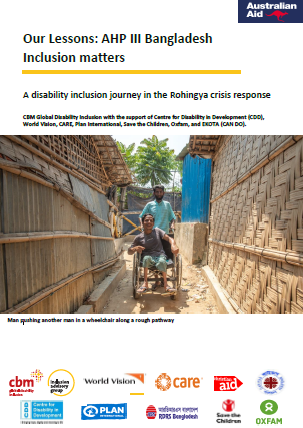
This report documents achievements and lessons learned and presents recommendations to progress disability inclusion further in the Rohingya response and for the humanitarian sector at large.
The report AHP III Bangladesh: A disability inclusion journey in the Rohingya crisis shows that, despite the challenges and complex context of AHP Phase III, the impact made in progressing disability inclusion is significant. Substantial progress was seen in the development of Self-Help Groups and the increase in accessible services and uptake of the Washington Group Questions. The organisational ripple effect and collective learning were also successful elements of AHP Phase III.
AHP Phase III showed the humanitarian sector what is possible in realising inclusion of people with disabilities within a complex humanitarian environment, and how consortium organisations and their partners collaborated to achieve common goals and progressed learning on disability inclusion. AHP Phase III’s approach to disability inclusion has been incredibility powerful in creating organisational and programmatic change. Delivery, visibility, and continuity of disability inclusion support is critical to build on and maintain momentum developed in AHP Phase III, because inclusion matters!
This publication has been funded by the Australian Government through the Department of Foreign Affairs and Trade. The views expressed in this publication are the authors’ alone and are not necessarily the views of the Australian Government.
More information
- The project page ‘AHP to increase resilience and self-reliance of Rohingya and host populations in Bangladesh’
- Impact report: AHP Phase III Bangladesh Impact Report: An honest account
- Learning trip ‘AHP Bangladesh Consortium making disability inclusion a reality’
↓Download AHP III Bangladesh: A disability inclusion journey in the Rohingya crisis 1.1mb pdf
